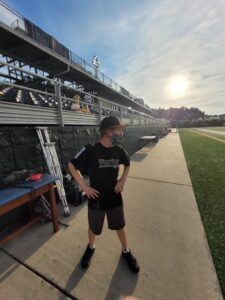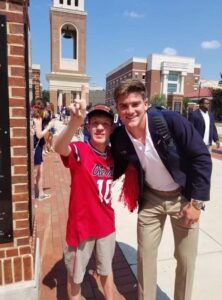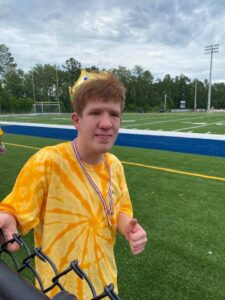The individual[s] interviewed for this illness narrative has given express permission for this narrative to be published on our course website publicly, with their full names attached and any other identifying details. These individuals understand that they can alter these permissions at any time.

Friday nights in October are made for football, and there’s no question that Drew Lockett is the number one fan of the local high school football team! “It was the first home game of the season, and I was in the crowd, beaming, probably bawling like a baby, watching Drew be a part of the team,” says Drew’s mom, Ramona Lockett. “He was on the field next to the football players and coaches, making sure that the team stayed hydrated. To me, that’s what inclusion looks like.” When Drew was born through an emergency C-section, the doctors didn’t initially suspect that anything was wrong, but Ramona Lockett had a feeling that something was off. She called it mother’s intuition. At six months old, Drew was referred out of the local health department to the University of Southern Mississippi’s pediatric team, where Drew was officially diagnosed with an intellectual disability due to lack of oxygen at birth. Mrs. Lockett told me “Even though most people cannot put a name to his disability, like they can with Autism or Down Syndrome, they do know that there is something there.” In a recent study, psychologists found that giving the condition a label “can dictate the life paths of those so labelled, particularly if labels are also associated with stigma” (Cluley 25). There are thousands of individuals who are trying to break this stigma and show people that an intellectual disability doesn’t define their life, which is why I wanted to share Drew’s story.

All throughout Drew’s life, he and his family have navigated life with a disability, but their experiences were not limited or defined by this diagnosis. They carry on just like the rest of us, Drew has the same goals, dreams, and expectations that you would expect from any other young adult his age. For Drew, daily life may bring forth a few extra challenges, but he doesn’t see this as a barrier to stop him from living life to the fullest. Researchers found that “people with intellectual disabilities–regardless of their awareness of their own disability status–experience stigma” (Monteleone 302). Drew is aware of his disability, and in many ways, he breaks the stigmas regarding intellectual disabilities by continuing to work towards his goals and being an active member in the community. As the head water boy of the local high school football team, not only is he pursuing his passion for football, but is also representing diversity and inclusion within his community.

Mrs. Lockett says, “Drew meets no stranger,” and it’s true! From the very first time I met Drew, he has been the most approachable and kind person you could meet. It’s not surprising that whenever Drew is out and about, he is almost always recognized by someone. He is also a part of many local organizations. Drew starts the week off by attending Rise and Shine College at the ARC, an organization that “is devoted to providing community-based services to all individuals with intellectual disabilities and their families” (The Arc Southeast Mississippi). Here Drew loves to spend time with his friends, make pottery, go to weekly activities such as bowling, or movies, and take part in music therapy. Drew’s day doesn’t just end at ARC–in the evenings he enjoys extracurricular activities like cheer, Special Olympics, and trips to Target. Often, you can also find Drew at local events such as marathons and sporting events. There have been countless races where I have seen Drew and his family dressed up and holding up signs for the runners.
While Drew’s day is full of a wide range of activities, he has to face some daily struggles that might not be clear to those who don’t personally know him. Sometimes it’s struggling with fine motor skills like buttoning his shirt, and sometimes it’s dealing with anxiety about riding in a car or being away from family. Despite these difficulties, Drew still manages to carry on. He says that no matter how big or small the struggle is, he can always count on his parents, Poppy (grandfather), ARC directors, and his best buddy, John Rhys Plumlee, to help him through difficult times. As a mom, Ramona Lockett, says the best way she can help Drew is to support and reassure Drew about his insecurities; “We keep trying, and we approach each obstacle one at a time.” Drew sets goals and works hard to achieve them, nothing can stand in his way.

A part of inclusion is knowing how to support an individual through challenges. Mrs. Lockett emphasizes that it’s so important to focus on the abilities rather than the disabilities of a person. She says, “Inclusion is when we find different ways to help each other participate as a group.” In Drew’s life, there have been many times when people have practiced inclusion that, in turn, gave Drew so many opportunities to create memories. In particular, Drew and his mom told me about the time when Drew’s best Buddy John Rhys invited him to a class party. Drew’s mom said that she and her husband were going to stay, but John Rhys insisted that they should go and that he would take care of his friend. “I’ve got this, I’ll take care of my boy,” he said. At that moment John Rhys wasn’t Drew’s caregiver, he was a genuine friend; there wasn’t a difference between the two boys. This friendship started in middle school and from football to parties, Drew and John Rhys did everything together. Drew got to watch and cheer for John Rhys when he lead the high school football team to the state championship game. They went to dances together, and they even got to walk across the same stage for graduation. When Plumlee signed with Ole Miss, Drew became their biggest fan! High school was a time when Drew felt the most included among his fellow peers which made his experience extremely memorable. As a result, graduating high school has been the most difficult transition for him.
Even though Drew has been a part of the ARC community for years, transitioning there full-time was hard for him. He often is reminiscent of all the memories he made in high school. The experiences, the memories, the friendships, and the structure he had in high school were hard to replace. However, ARC does a terrific job at community inclusion and gives Drew so many opportunities to feel included just like how he felt in high school. The ARC puts a big emphasis on exploring and learning about the community through activities like visiting the local military base, going to support the local university, and even hosting events themselves. Just recently, Drew, along with other members of the ARC, were a part of a talent showcase where the individuals got to perform and show the community what they have been working on in music therapy.

The ARC has also been an important part of Ramona’s life. Just as it is important for Drew to feel included, knowing other families that go through similar experiences serves as a support system for parents. Mrs. Lockett says that ARC gave her and her husband an outlet to meet other parents in the disability community and the ARC presented so many resources to both their family and Drew. Specifically, the ARC provides respite care for Drew, which allows his family to have more flexibility in the day without having to worry about how he would handle the situation and gives Drew some independence from his primary caregivers. Research has shown that a family is “more likely to use respite care if they can be confident that the standard of care is high” (Guerin 297) which is why many organizations like the ARC serve as an outlet for families to find quality respite services.
Trusting someone to care for an individual is a vulnerable decision whether that care is short-term respite care or long-term care in the form of a group home. As individuals with disabilities grow older, their caregivers must start thinking about the future. Ramona says that they always are thinking about Drew’s future and what that would look like. They have had important conversations with Drew about this, and Drew is reassured that he is surrounded by a big family and community that is there supporting him. For now, Drew is thinking about the near future and all the excitement that is in store this summer. He told me he was excited about attending the Abby Rogers Civitan Camp and the Rise and Shine Summer Adventures Camp this summer because it gives him an opportunity to reunite with his old high school friends and make new memories.
Drew’s personality always shines bright, and it is my privilege to know him and his family. Drew’s life isn’t defined by his intellectual disability, but rather by his family, friends, and of course football. In the years to come, I am confident that Drew is going to continue to work hard, accomplish goals, have fun, and be an example of how people with disabilities can navigate life in their own way. As Mrs. Lockett says, “There’s always more than one way to do something, and it can look different for everyone, we just have to choose to look past normal.” Drew and countless others exemplify this every day and they show society that while there are obstacles in their life, these obstacles don’t have to be limitations! “Don’t count me out, I want to do it too! I can do it.” – Drew Lockett
Works Cited:
“Arc Southeast Mississippi.” Hattiesburgarc.com, https://hattiesburgarc.com/welcome-/.
Cluley, Victoria. “From ‘Learning Disability to Intellectual Disability’-Perceptions of the Increasing Use of the Term ‘Intellectual Disability’ in Learning Disability Policy, Research and Practice.” British Journal of Learning Disabilities, vol. 46, no. 1, 2017, pp. 24–32.Wiley Online Library, https://doi.org/10.1111/bld.12209.
Guerin, Suzanne, et al. “Staff and Family Views of Alternative Respite Services for Adults with Intellectual Disabilities – Aims, Outcomes and Experiences.” International Journal of Developmental Disabilities, vol. 67, no. 4, 2019, pp. 296–306. Taylor & Francis Online, https://doi.org/10.1080/20473869.2019.1665773.
Monteleone, Rebecca, and Rachel Forrester-Jones. “‘Disability Means, UM, Dysfunctioning People’: A Qualitative Analysis of the Meaning and Experience of Disability among Adults with Intellectual Disabilities.” Journal of Applied Research in Intellectual Disabilities, vol. 30, no. 2, 2016, pp. 301–315.Wiley Online Library, https://doi.org/10.1111/jar.12240.
Lockett Drew, and Lockett Ramona. Teleconference interview. Conducted by Shruti Madhav. 6 April. 2022.
Images:
Lockett, Ramona. Pictures of Drew. Author’s personal collection.
Madhav, Shruti. Special Olympics 2019. October 2019. Author’s personal collection.
One Response to “Drew Lockett: Family, Friends, Football”
Ramona Lockett
I was so honored to be asked to interview for this assignment. Drew has brought so much joy to our family and life. We love Shruti! Shruti, I could see how much Drew meant to you through this assignment. Thank you for loving him and for loving this work with people with disabilities. I could tell this was much more than just an assignment for you. Thank you for choosing us to do this assignment with. We enjoyed it!!